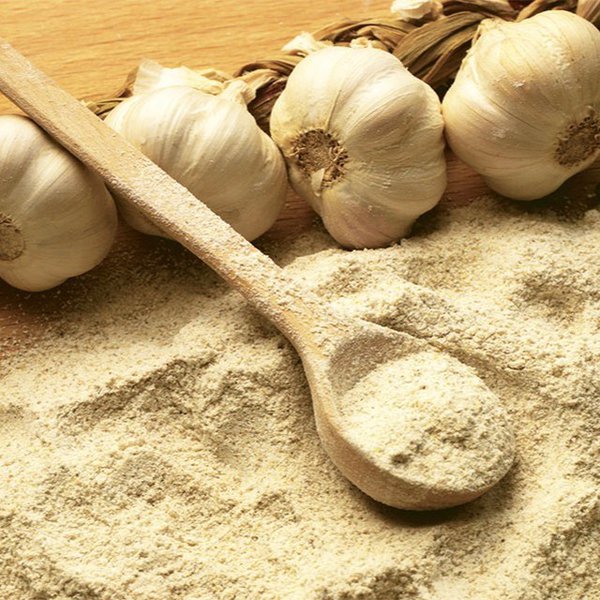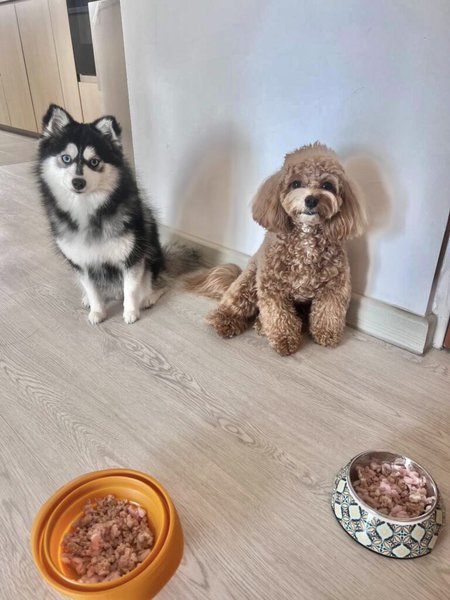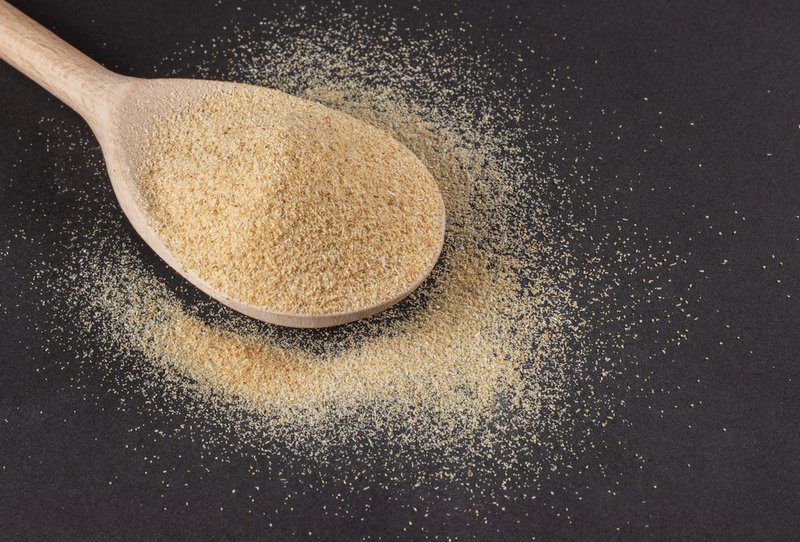Besides its culinary usefulness, garlic powder offers a potent remedy for many human conditions such as the common cold, high blood pressure, and heart disease. Given these tremendous health benefits offered to humans, your question on whether dogs can eat garlic powder is valid. Here is the answer:
Dogs should not eat garlic powder. It contains thiosulphate and disulfide, which damage canines’ red blood cells by oxidation, resulting in hemolytic anemia. Anemia in pups manifests as general body weakness, fast breathing, decreased activity, pale mucus, dark-colored urine, and jaundice.
Besides the health setbacks mentioned above, there are other risks associated with dogs eating garlic powder that you should know. I’m sure you’d like to know if canines ever have anything to benefit from this powdered vegetable. Be assured that you’d find all your answers in this piece, but let’s first highlight the fate of a dog that has eaten garlic powder.
What Happens If A Dog Eats Garlic Powder?

If a dog eats garlic powder, it may die, develop anemia, have gastrointestinal disturbances, or just be okay. The fate of a pup in this matter depends on its breed, size, and the quantity of garlic powder consumed.
Some dog breeds are particularly prone to severe food poisoning than others. As a result, even if they eat garlic powder in moderation, they are most likely to develop various gastrointestinal issues such as diarrhea, vomiting, and abdominal pain. Examples of such breeds include Akita, Shiba Inu, and Japanese Spitz, all from Japan.
Since different dogs metabolize garlic at different rates, the more sensitive your dog is to food toxicity and poisoning, the more likely it would be affected by garlic powder.
Also, bigger dogs are less affected by small quantities of garlic powder than smaller ones, and that’s because they have a large surface area to spread the effect. On the contrary, puppies and smaller dogs will easily develop anemia and other complications by taking garlic powder.
Puppies should not even eat garlic powder because they don’t start producing red blood cells until after six weeks. Generally, the more quantity of garlic powder your furry friend consumes, the more toxic and dangerous it becomes to it. Most dogs will only have mild or no symptoms with a little quantity.
So, let’s check out the exact quantity of garlic powder that can spell doom to your furry friend below.
How Much Garlic Powder is Toxic To Dogs?
Based on research findings, it would take between 0.25 to 0.6 oz of garlic powder per pound to prove fatal to a dog. That means that a 70 lbs dog, for instance, would have to take between 35 to 84 oz of garlic powder before it can result in death. Fatality becomes real if a dog weighs less and eats more of this vegetable.
And before you think your dog can never cross that 35 to 84 oz mark, you should note that a clove of garlic weighs about 0.25 oz. So, if your pup consumes half a glass of this spice, either raw or in a food, the consequence can be severe.
That aside, many vets claim that there are many subclinical symptoms that even a tiny dose of garlic can cause in a dog. While you won’t see or notice these symptoms immediately, they can add up over time to become something serious.
However, in the case of accidental, one-time consumption, most dogs don’t show any side effects, so far as the garlic powder is not much. You only have to ensure your pet does not take this spice very often because it can quickly reach the red line of 84 oz if it consumes garlic powder regularly.
Interestingly, some dog foods contain garlic powder as part of their ingredients. What is the reason for this, and what benefit does it offer? We’ll answer this question next.
Why Is Garlic Powder Included In Dogs’ Food?
Some commercial dog food manufacturers include garlic powder in their recipes because they believe it has antimicrobial properties and aids digestion. Some others add it because of its flavor to the food or the belief that it helps control fleas and ticks in dogs.
Garlic powder can indeed be beneficial to dogs, given how humans have used it medically since the days of Hippocrates. However, the known risk of this allium plant to dogs is why pet owners have to toe the line of caution while considering it as a treat.
As earlier noted, dogs that take garlic beyond their carrying capacity can die or battle garlic poisoning. That’s because of the thiosulphate in this vegetable that denatures the hemoglobin of the red blood cells. Of course, the result is hemolytic anemia, which can manifest in different ways.
That is why you must always check the labeling of any dog food you purchase in the market. If your dog is susceptible to food poisoning, it will likely find garlic powder poisonous. Additionally, you should consult a vet to help determine the suitability and dose of garlic powder for your dog if you consider it a treat.
Is Garlic Salt Good For Dogs?
The answer is an emphatic no. Garlic salt is not suitable for dogs, and apart from the toxic disulfide and thiosulphate present in garlic, salt can cause dehydration and stomach upset in canines.
Dehydrated or dried garlic contains essentially the same component as the fresh one. So, the same threat that garlic powder or raw garlic poses to dogs is the same that garlic salt does.
And while a bit of salt may not harm your furry friend, its combined effect with garlic can quickly make things go south. Excessive salt consumption will undoubtedly result in sodium poisoning and dehydration, necessitating a trip to the vet’s clinic.
So, the best thing to do if you have garlic salt at home is to keep it out of reach of your canines.
Now, let’s take another look at this subject by considering whether eating food prepared with garlic powder is safe. For instance, everyone agrees that meat or flesh is okay for dogs. But can dogs eat meat cooked with garlic powder? Find out the answer below.
Can Dogs Eat Meat Cooked With Garlic Powder?

No, dogs should not eat meat cooked with garlic powder. Cooking garlic does not diminish its toxicity to dogs. On the contrary, there are shreds of evidence that cooked garlic powder may even be more poisonous than raw ones.
Since you probably didn’t measure how much garlic powder was added to the meat as a seasoning, you would have a hard time tracking how much of it your dog consumed with the meat. However, if you prepared the meat yourself and are sure you didn’t add too much garlic powder, your dog can safely taste it without any problems.
But besides the concern of overdose, meat cooked with garlic powder will most likely contain other ingredients and seasonings that may disrupt your pups’ gastrointestinal balance. As such, it’s not safe to let your dog eat cooked meat from an unknown source.
But are there safe ways to incorporate garlic into one’s canines’ food? Let’s find out.
How Do I Feed My Dog With Garlic?
The best way to feed your dog with garlic is to begin small. No matter the size of your pup, if you start small, you can quickly detect whether it likes it. Again, the garlic you will give to your canine must be fresh and unprocessed.
When feeding garlic to your pup, your first goal will be to determine if it tolerates it. It would pay not to force this process. Simply drop half a quarter clove or garlic beside the feeding bowl of your canine and watch whether it takes it. You can then gradually include it in your dog’s food if it does.
Once you ascertain that your canine does not dislike garlic, your next focus will be to determine the correct dose. As reiterated from the beginning of this article, the main concern with feeding dogs with garlic is toxicity, as too much of it in their system can prove fatal.
The appropriate dose of garlic for your dog depends on its weight, and see below the recommended dose based on your dog’s weight:
- 5 lbs: ⅙ tsp
- 10 lbs: ⅓ tsp
- 15 lbs: ½ tsp
- 20 lbs: ⅔ tsp
- 30 lbs: 1 tsp
Using garlic cloves as a means of measurement is not safe because each garlic has different clove sizes. It is also good to start even below the above recommendation if you are unsure of your dog’s reception of this spice.
Can Dogs Have Garlic Powder As Treat?
Yes, dogs can have garlic powder as a treat if given sparingly and in small quantities. However, since there are other less risky options, it shouldn’t come as a first choice.
Other alternatives to garlic powder as a treat for dogs include sweet potatoes, apples, carrots, and vegetables. However, it would be best to give these in moderation as formulated dog food should account for more than 90% of your furry friend’s diet.
Does Garlic Powder Prevent Tick On Dogs?
Although several pet owners make this claim, there is no conclusive evidence to prove that garlic powder prevents ticks or fleas from dogs.
The idea behind using garlic powder to deter ticks and fleas from canines is that it makes the pet secrete odors that are offensive to these pests. While occasional success may have been reported, there are no guarantees that it works in all cases for all dogs.
Besides the lack of conclusive evidence on the effectiveness of garlic powder in controlling ticks in dogs, the risk of garlic poisoning cannot be set aside. Since you would have to use it consistently to achieve the result, the accumulative effect might damage your furry friend.
Using ticks and fleas medication is a less risky way to control pests on canines. A vet can guide you appropriately on this, including the dose. So, get the proper medications instead of using a homemade method such as garlic and brewer yeast, which may be ineffective and toxic.
What Do I Do If My Dog Ate Garlic Powder?
The safest thing to do if your dog eats garlic powder is to head straight to a vet. You can help your vet follow the right course of action by supplying critical information such as the quantity ingested and when the dog took it.
If your canine recently consumed the garlic, your vet will typically induce vomiting with medication, so your dog can expel some of the garlic. They may decide to suggest intravenous fluids for hydration, or a blood transfusion may be needed in severe cases. The earlier you seek help, the better for your furry friend.
If your pup only took a minimal quantity of garlic powder, you may not have to see a vet. Most dogs hardly display any severe symptoms of garlic poisoning if taken in minute quantities. You may, however, have to give more water to guide against dehydration.
Let’s now consider the symptoms of garlic poisoning in dogs that you can watch out for if your furry companion has ingested some.
What Are The Symptoms Of Garlic Poisoning In Dogs?
Decreased activity and vomiting are among the most typical symptoms of garlic poisoning in dogs. However, symptoms can vary depending on the quantity of garlic your pet took and when they did.

Other likely symptoms of garlic poisoning to watch out for include:
- Dehydration
- Anemia
- Bad breath
- Diarrhea
- Collapse
- Nausea
- Difficulty in breathing (dyspnea)
- Lethargy
- Drooling
- Depression
- Increased respiratory rate
- Seizures
- Unwillingness to exercise
If your dog displays two or more of these symptoms, especially those related to anemia, you should not hesitate to visit a vet immediately.
How Do I Prevent My Dog From Eating Garlic Powder?
To prevent your dog from eating garlic powder, keep it out of their reach. Since dogs love to sniff almost anything, you cannot afford to be generous with how you keep this toxic spice.
Another way to prevent your dog from eating garlic powder is to avoid feeding it with table scraps. Apart from garlic poisoning, you cannot guarantee the other ingredients in such scraps.
Besides, dogs regularly fed with table scraps are prone to obesity and other health issues. To guard against your pup eating garlic growing wild around your home, you should regularly inspect your garden to see what crop types grow there.
And if you’re going out to someone else’s field, be sure to monitor your canine’s movement so they don’t eat left-over garlic.





